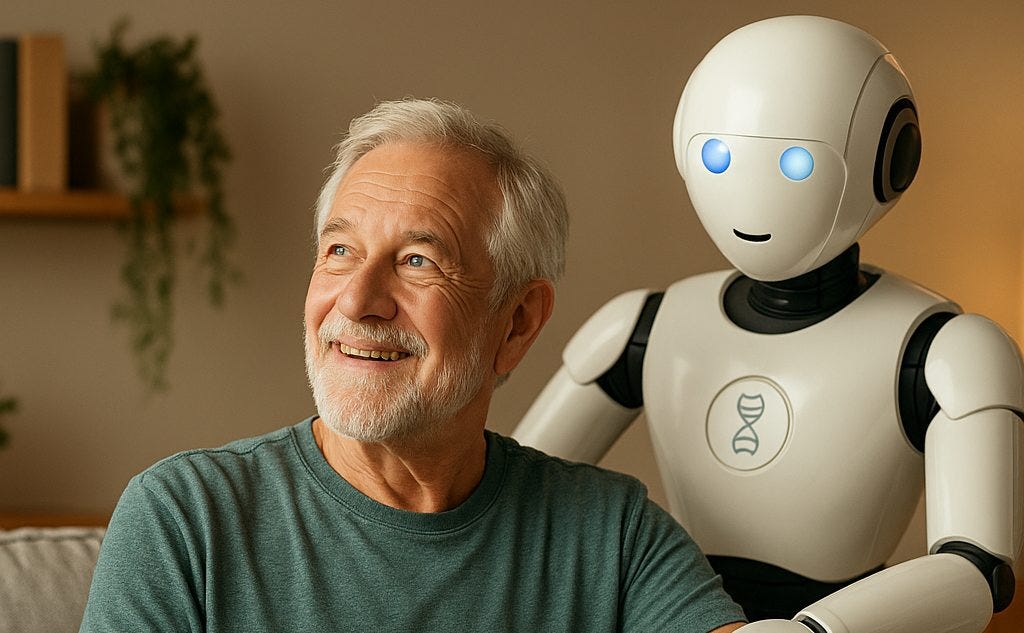5 Ways AI Is Already Helping You Live Longer (Without You Realizing It)
From stealthy blood tests to menu‑tweaking algorithms, the silicon genie is quietly stretching your warranty on planet Earth. 🧬✨
You probably think of artificial intelligence as the chatbot that drafts your emails or the algorithm that suggests your next binge‑worthy series. Yet, behind the scenes, AI is moon‑lighting as a life‑extension specialist—spotting cancers before the first symptom, nudging your heart back on course, and even whispering recipe tweaks to keep your arteries unclogged. I might be overstating ever so slightly, but the evidence piling up this year suggests we're already outsourcing chunks of our longevity strategy to machines—often without even noticing.
Ready for a peek at the secret playbook? Let's tour five under‑the‑radar ways AI probably already adds candles to your future birthday cake.
1. Blood Tests That See Around Corners 🩸🔬
A new generation of multi‑cancer early‑detection (MCED) blood tests uses AI to sniff out microscopic fragments of tumor DNA hiding in plain sight—sometimes three years before conventional scans raise an eyebrow. A federally funded Vanguard Study kicking off this summer will pit two AI‑assisted tests (from Guardant and ClearNote) against standard screening in 24,000 volunteers aged 45‑75. Researchers hope the algorithms will flag up to 20 hard‑to‑screen cancers at once, giving doctors a head start when odds of survival soar.
If the trial confirms what early data hint, grabbing a quick vial of blood at your annual check‑up might one day replace a hodge‑podge of mammograms, colonoscopies, and awkward gown moments. Sure, skeptics worry about false positives and sticker shock (current price tags flirt with $900 a pop), but the very notion that software can detect ghost tumors before they have a ZIP code is, frankly, mind‑bending. And possibly life‑saving.
Also read: 3 Longevity Blood Tests You’re Not Getting—But Should Be
2. Wearables That Eavesdrop on Your Heart ❤️⌚
Your smartwatch isn't just nagging you to stand; it's quietly auditioning for the role of cardiology resident. A July 2025 review in NPJ Cardiovascular Health chronicles how AI models trained on billions of wrist‑based data points can now predict heart‑failure risk from a single‑lead ECG, detect atrial fibrillation while you sleep, and foresee dangerous blood‑pressure spikes—all without a clinic visit.
Consider the real‑world crossover study where a deep‑learning algorithm monitored 140 million heart‑rate datapoints and correctly gauged patients' New York Heart Association class—no treadmill stress test required. The upside? Early warnings mean earlier lifestyle tweaks or meds, which probably shaves whole chapters off future hospital charts. The downside? You can't accuse your watch of nosiness; it has receipts.
Quick win: Next time your wearable pushes a "high heart‑rate alert," treat it like a text from your future self. Maybe take that walk.
Related: 7 Wearables That Help You Track Aging—And Actually Do Something About It
3. Drug Discovery in Hyper‑Drive 💊🚀
Traditional pharma works like a meticulous watchmaker—single target, single tool. AI, ever the over‑achiever, smashes that model. In May, scientists at Scripps Research and longevity startup Gero unleashed a machine‑learning engine that scanned existing compound libraries and spat out 22 poly‑pharmacological candidates; 16 extended the lifespan of C. elegans, one by a whopping 74 percent.
Yes, worms aren't people (insert obligatory hedging phrase here). Still, the study hints that AI can juggle multiple aging pathways simultaneously—dopamine, serotonin, histamine—faster than an army of post‑docs. That could shrink the "lab‑bench‑to‑pill‑bottle" timeline from decades to years, dragging once‑sci‑fi interventions into Medicare formularies before you learn to pronounce "rapamycin."
4. Personalized Nutrition That Sneaks Into Your Grocery Cart 🥑📲
Remember food pyramids? AI bulldozes them and sketches bespoke nutrition blueprints instead. A May 2025 Frontiers in Aging perspective outlines a seven‑pillar framework for ethical, AI‑powered dietary personalization—think continuous glucose monitors, microbiome readouts, and menu suggestions fine‑tuned to your genes and daily step count.
While the paper politely reminds us that bias and privacy potholes lurk, early pilots already show AI‑generated meal plans improving metabolic markers faster than generic "eat more salad" advice. In other words: your fridge might soon ping you a recipe that dodges your family's cholesterol curse and keeps taste buds cheering. Emerging apps even auto‑populate online grocery carts with compliant foods—hands‑free longevity shopping.
Pro tip: If a nutrition app asks to scan your plate, oblige. It might shave silent years off future cardiology bills.
Also read: 6 Foods Longevity Scientists Eat Every Week (And Why You Should Too)
5. Responsive Care Tech—The Invisible Safety Net 🤖🏡
At Penn Nursing's NewCourtland Center, researchers coin the term Responsive Care Technology: AI‑enabled sensors and companion robots that spot fall risks, detect early cognitive decline, or simply video‑call the grandkids when loneliness creeps in. The May 2025 think‑piece argues that blending empathy with algorithmic foresight could help older adults stay independent longer while reducing caregiver burnout.
Picture a smart lamp that notices erratic gait patterns and whispers to your physician, or a voice assistant that notices medication lapses and nudges you—politely—to gulp that statin. None of this screams "futuristic." It just happens, quietly extending quality life years in the background. Critics might mutter about Big Brother vibes, but frankly, if the trade‑off is an extra decade of living at home instead of the nursing‑facility shuffle, many will sign on the dotted line.
So, What Should You Do Next?
Ask smarter questions at your next physical. Does your clinic offer AI‑assisted screening?
Audit your wearables. Are you actually acting on the alerts—or just swiping them away?
Test‑drive a personalized‑nutrition app for one week and note the energy bump.
Stay skeptical but curious. Technology evolves; your health literacy should too.
And if you're hungry for more longevity hacks, hit that subscribe button below. Let the algorithms know you're on to them. 😉


